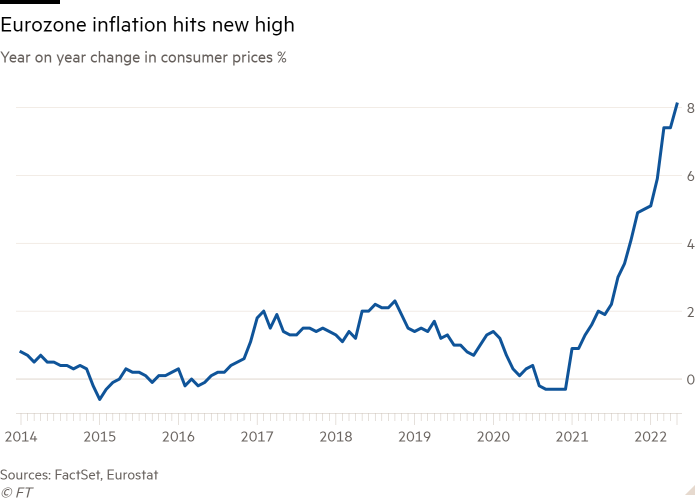Government bonds dropped on Tuesday after hotter than expected eurozone inflation data and rising oil prices intensified questions about how far central banks will lift interest rates and how much that monetary tightening would curtail growth.
In Europe, the yield on Germany’s 10-year Bund — a proxy for borrowing costs across the eurozone — added 0.07 percentage points to 1.12 per cent, extending a bout of selling from the previous session after German inflation data also came in worse than expected. Italy’s equivalent yield rose 0.12 percentage points to 3.11 per cent. Yields on longer-dated bonds move with growth and inflation expectations.
US bonds similarly dropped, with the yield on the benchmark 10-year Treasury note climbing 0.1 percentage points to 2.84 per cent.
Those moves came after data on Tuesday showed that eurozone consumer price growth reached 8.1 per cent in May, up from 7.4 per cent in April and higher than economists’ expectations of 7.7 per cent.

For Jim Paulsen, chief investment strategist at The Leuthold Group, the EU’s agreement on a ban on most Russian oil imports was the main driver of bond selling on Tuesday.
Brent crude, the international oil benchmark, rose 1 per cent to $122.85 a barrel, in a move that stoked worries about even higher inflation and more rate rises in the US and Europe, Paulsen added.
“[Rising energy prices] will feed into [the US] consumer price index and raises the spectre of fear that inflation will not moderate as fast as we thought it would,” he said. “That’s a change from last week and it’s what’s really hitting stocks and bonds.”
In equity markets, Wall Street’s S&P 500 was flat in mid-afternoon Tuesday trade in New York after falling in early dealings. The technology-heavy Nasdaq Composite was up 0.4 per cent. Europe’s regional Stoxx 600 stock index ended the day down 0.7 per cent, while Germany’s Dax closed 1.3 per cent lower.
Inflation remaining stubbornly high will pile further pressure on the European Central Bank to raise rates, said Kasper Elmgreen, head of equities at Amundi, Europe’s largest asset manager. “The direction of travel from a number of data points shows inflation in Europe is surprising on the upside. We haven’t seen the peak yet.”
Ahead of Tuesday’s European inflation data, Philip Lane, chief economist of the ECB, had said that quarter-percentage-point rate rises in July and September would be its “benchmark pace”. He noted in an interview with Spanish business newspaper Cinco Días that the process of withdrawing stimulus “should be gradual”.
The prospect of rising rates and slowing growth creates an “anti-Goldilocks” scenario for markets where neither bonds nor stocks are attractive, said Hani Redha, a multi-asset strategist at PineBridge Investments.
Elsewhere in equities, Hong Kong’s Hang Seng index gained 1.4 per cent, after data showed China’s manufacturing activity in May contracted at a slower pace than the previous month. An official manufacturing purchasing managers’ index rose to 49.6, up from 47.4 in April. Any reading below 50 signals a contraction.
Shanghai on Monday evening also announced a partial easing of some of its coronavirus lockdown restrictions.


